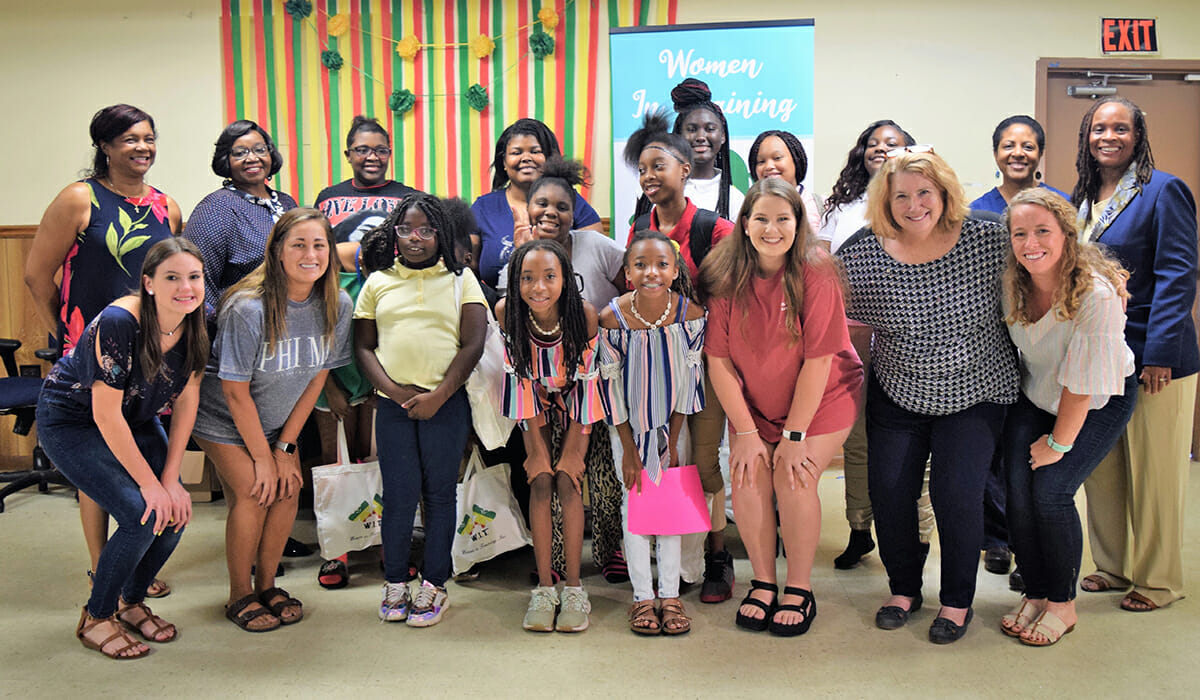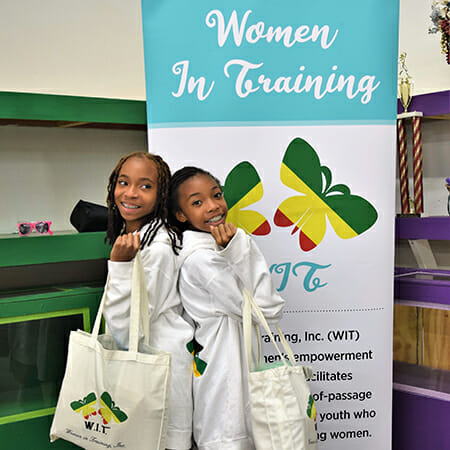Twins Fight Period Poverty By Donating Menstrual Products to Girls in Need

Meet Daily Point of Light Award honorees Brooke and Breanna Bennett. Read their story and nominate an outstanding volunteer or family as a Daily Point of Light.
For most women and girls, hygiene products such as pads, tampons, toothbrushes and body wash are just another arbitrary item to toss into the shopping cart. However, there are also many girls living in underserved communities who can’t afford the monthly cost of such products. During their period, many of these girls skip school, miss work, use household items in place of pads and tampons, or use the same menstrual product repeatedly.
When twins Brooke and Breanna learned that students at the all-girls school their mother worked at were using socks and toilet paper during their periods because they couldn’t afford to buy menstrual products, they knew they wanted to help end “period poverty.” The girls founded Women in Training, Inc. (WIT) in order to provide monthly donations of WIT KITS, bags containing menstrual and hygiene products, to young women in need. Now 12 years old, Brooke and Breanna have donated about 300 WIT KITS to girls in their Montgomery, Al. community and surrounding area. They even inspired State Rep. Rolanda Hollis to introduce a bill currently in the 2020 Legislative Session which would require schools to provide free menstrual products in bathrooms.
Points of Light spoke with Brooke and Breanna as well as their mother, Adeyela Bennett, who is the Vice President and CEO of Women in Training.
What gave you the idea to start Women in Training?
Brooke: My mom used to work at an all-girls school where her students would go up to her and ask her for pads because they didn’t have it. They would use socks and tissue paper and stuff like that instead of pads because they couldn’t afford it. My mom would give it to them. We decided that we would do something like Women in Training so we could help those girls.
Describe what Women in Training does.
Brooke: We make these WIT KITS which are kits with pads, tampons and a bunch of stuff to keep you in good shape. We have toothbrushes, toothpaste, body wash. We give them away to underserved girls. … We published a brochure on the menstrual cycle. It tells you a bunch of stuff about your menstrual cycle and in the WIT KITS we also give away these little cards with more information about your menstrual cycle so girls can be more informed.
Breanna: Also in the kits, we include handmade bracelets for these girls, and we include some fluffy socks and shampoo and conditioner. We have journals for them to write in and we have some more female anatomy brochures. We also include toothbrushes and things to keep your hygiene good.
Adeyela: Dr. LaToya Clark is our medical advisor, so whenever we do a giveaway, she does a 20-minute menstrual education talk to educate girls about the biology of their bodies, how to take care of themselves and what to expect. The reason she’s doing it is in her practice, she has adult women in their 30s, 40s, 50s and beyond who still don’t understand the female anatomy and how to properly care for themselves, so she wants to make sure that the next generation is more informed. That’s an important part of the program.

Why is it important that girls have access to these hygiene products?
Breanna: It’s so important for girls to have access to these products, especially for free, because you can’t really control that females have a menstrual cycle. Because you can’t control it, I think it should be provided to you to keep you healthy and clean.
Why did you want to include additional items, like bracelets and journals, along with the hygiene products?
Brooke: So they can write their feelings down and what they feel like and stuff like that.
Breanna: We also put inspirational quotes in these journals to keep the girls staying positive.
Brooke: We have Dr. Lee Farrow make the bracelets and she puts words on it like ‘brave,’ ‘strong,’ ‘beautiful,’ so they can encourage the girls to be inspired to be those things.
Adeyela: The girls were making them but time got to be a big issue. Dr. Lee Farrow heard about them and called us and volunteered to make them. She teaches Russian [history] at Auburn University at Montgomery, so it’s amazing to me that a history professor would want to take her time doing this, just to relieve the girls and to support the project. Breanna came up with the idea of the bracelets because she didn’t want the girls to feel like charity cases. She wanted to give them something just to make them feel special, and that’s how they got started making the bracelets.
Can you describe the advocacy work you’ve helped with, and why the bill is important?
Brooke: Representative Rolanda Hollis filed a bill that girls in public schools could have pads and stuff like that in Alabama. We went to the state house to meet her.
Breanna: I think it would just be amazing for the girls at public school to not have to use socks and unhygienic products every month for their menstrual cycle. It’s really important for them to stay healthy and clean.
Adeyela: When we went to visit Rep. Hollis, she said that Breanna and Brooke were the inspiration behind her introducing the HB-237. She heard about the work they were doing and said ‘They’re doing Montgomery and neighboring counties, but what about girls in other parts of Alabama?’

How did it feel to hear that from Rep. Hollis?
Breanna: It made us feel really good to see that so many people support the work we are doing and so many people want to spread it to their counties and even their whole different state.
Are there any future partnerships, programs, or events that you are excited about?
Adeyela: [There is] a Christian organization [First Christian Church] that provides foster care for young people in the community. One of the social workers with that group was telling us that they often don’t have the basic things they need, so on April 18, we’re having a big event where Dr. Clark will do the menstrual education and we’ll give out hundreds of WIT KITS to youth in foster care in Alabama. Then in May, we’re doing a Mother’s Day giveaway to girls whose mothers are imprisoned.
Brooke: We have the WIT Tea Party on July 18.
Breanna: We’re going to have refreshments and celebrate a whole year of founding WIT and talking about what we want to do in the future of WIT.
What’s been the most rewarding part of your work?
Breanna: Seeing the happy smiles and faces of the girls we give these kits to, and also seeing how supportive people are.
What do you want people to learn from your story?
Breanna: I want people to learn that even us young people can make a difference in the world. You don’t have to wait until you’re older to start making a difference and change the world for better. I hope people learn that you shouldn’t be embarrassed about your menstrual cycle because it’s something that all women have to go through.
Do you want to make a difference in your community like Brooke and Breanna? Find local volunteer opportunities.